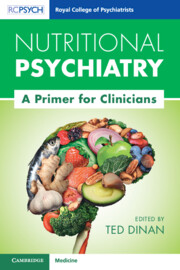Book contents
- Nutritional Psychiatry
- Nutritional Psychiatry
- Copyright page
- Contents
- Contributors
- Preface
- Chapter 1 Basic Principles of Nutrition
- Chapter 2 Diet and the Microbiome–Gut–Brain Axis
- Chapter 3 The Mediterranean Diet and Mental Health
- Chapter 4 Psychobiotics and Fermented Foods
- Chapter 5 Diet Interventions for Anxiety and Depression
- Chapter 6 Schizophrenia, Microbiota and Nutrition
- Chapter 7 Recognising the Importance of Nutrition for Child and Adolescent Mental Health
- Chapter 8 Old Age and Nutrition
- Chapter 9 Broad-Spectrum Micronutrients and Mental Health
- Chapter 10 Epigenetics
- Index
- References
Chapter 2 - Diet and the Microbiome–Gut–Brain Axis
Feeding Your Microbes for Mental Health Benefit
Published online by Cambridge University Press: 17 August 2023
- Nutritional Psychiatry
- Nutritional Psychiatry
- Copyright page
- Contents
- Contributors
- Preface
- Chapter 1 Basic Principles of Nutrition
- Chapter 2 Diet and the Microbiome–Gut–Brain Axis
- Chapter 3 The Mediterranean Diet and Mental Health
- Chapter 4 Psychobiotics and Fermented Foods
- Chapter 5 Diet Interventions for Anxiety and Depression
- Chapter 6 Schizophrenia, Microbiota and Nutrition
- Chapter 7 Recognising the Importance of Nutrition for Child and Adolescent Mental Health
- Chapter 8 Old Age and Nutrition
- Chapter 9 Broad-Spectrum Micronutrients and Mental Health
- Chapter 10 Epigenetics
- Index
- References
Summary
The assortment of trillions of microorganisms resident along the human gastrointestinal tract, our gut microbiota, has co-evolved with us over thousands of years. It can influence a plethora of aspects of human physiology, including host metabolism, immunity and even brain function, cognition and behaviour across the lifespan. The gut microbiota and the brain can communicate with one another, directly and indirectly, through immune system modulation, tryptophan metabolism, vagus nerve activity, the enteric nervous system and bioactive microbial by-products, or metabolites produced by the gut microbiome. Indeed, the gut microbiota are responsible for a rich reservoir of novel metabolites and bioactive substances that can have pleiotropic functionalities for the host. Moreover, diet, an easily accessible and thus powerful interventional tool, can act as a modulator of gut-microbial composition and activity, impacting on host physiology. As such, nutrition is seen as one of the major modulators of the gut microbiota. Intriguingly, although psychiatric conditions often include a dietary aspect, much research investigating this link in clinical populations ignores this relationship, missing a key therapeutic avenue. This has led to the concept of nutritional psychiatry, where we can use food and supplements to support mental health and brain function. As a result, it is critical to consider emerging microbiome-targeted dietary approaches with the greatest potential to improve health outcomes in a psychiatric population.
- Type
- Chapter
- Information
- Nutritional PsychiatryA Primer for Clinicians, pp. 15 - 38Publisher: Cambridge University PressPrint publication year: 2023

